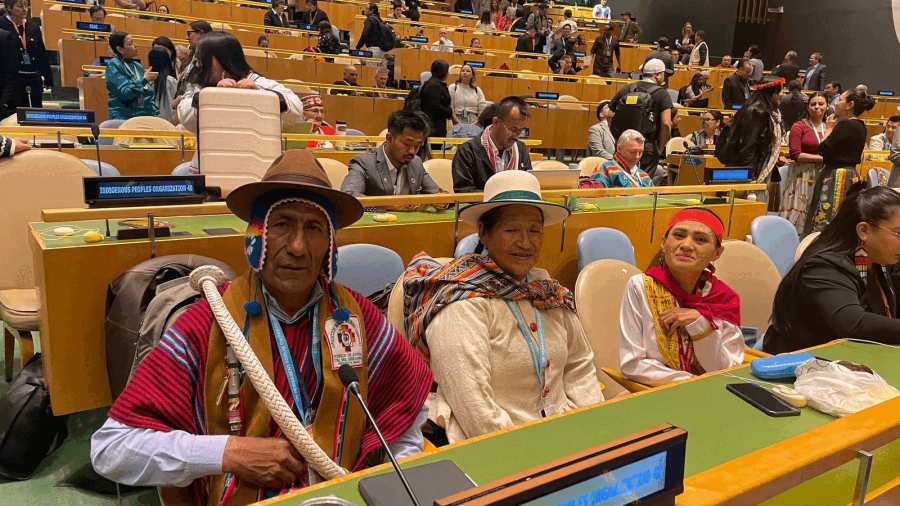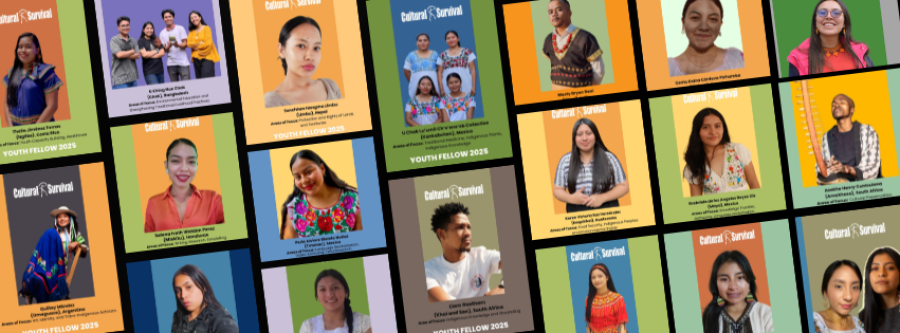This edition of the Cultural Survival Quarterly, which focuses on the rights of indigenous peoples to their lands and resources, goes to press during the count-down to the United Nations General Assembly’s adoption of the Declaration on the Rights of Indigenous Peoples. It is thus an opportune moment to reflect on what we at Cultural Survival mean when we say we “promote the rights of indigenous peoples.”
In the vernacular, “rights” are claims that someone else has a duty to fulfill by virtue of law, agreement, contract, or custom. Thus, my teenager might claim, “I have a right to my allowance because, as we agreed, I did all my chores.” If she in fact did her chores, I would have a duty to give the money to her. There is no law that requires me to do so, yet my daughter, all of her friends, and probably all of my friends would criticize me for failing to do so. And you can be sure they all would know because my daughter would complain loudly if I failed to pay.
The “rights” that Cultural Survival promotes are more than moral obligations. They are grounded in the body of international human rights law that emerged at the end of World War II from the collision between Western liberal thought and the moral catastrophe of the Holocaust. International human rights law is anchored in the Charter of the United Nations and elaborated in many subsequent international declarations and treaties. Like all international law, it is part of a legal system premised on sovereign states. Under international law, all countries have a duty to one other to promote and protect human rights, and they agree to subject themselves to the scrutiny and discipline of other countries if they fail to do so.
But the subject of human rights law, unlike other types of international law, is not countries but a state’s own people. And human rights law allows individuals and groups to make claims against their state when their rights are violated.
Two of the earliest human rights instruments adopted by the United Nations—the Universal Declaration on Human Rights (“UDHR” 1948) and the Convention on the Prevention and Punishment of the Crime of Genocide (1949)—laid the foundation for the laws that have evolved over the past 60 years. The UDHR provides that every individual, without discrimination of any kind, is entitled to the right to life; to freedom from torture, slavery, or arbitrary detention; to political rights such as freedom of expression and the rights to vote and participate in government. It likewise provides rights to food, health care, education, work, family, and participation in cultural life; and “the right to own property alone as well as in association with others. No one shall be arbitrarily deprived of his property.” The genocide convention, while narrow in scope, focuses on the protection not of individuals, but of groups.
It took 18 years for the UDHR to be codified in two binding treaties: the International Covenant on Civil and Political Rights, and the International Covenant on Economic, Social, and Cultural Rights, which the vast majority of countries in the world have now ratified. As a concession to communist governments, these treaties do not explicitly include a right to property. But in acknowledgement of the post-colonial politics of the mid-1960s, they share a common clause that grants to all peoples the right to self-determination. Further, the two covenants provide that, “All peoples may, for their own ends, freely dispose of their natural wealth and resources” and that, “In no case may a people be deprived of its own means of subsistence.”
This rephrasing of the language regarding the rights of groups to their lands and resources is especially important for indigenous peoples. Over the years these rights have been bolstered by regional human rights treaties, by decisions of international human rights courts, by the International Labor Organization’s Convention 169 on the Rights of Indigenous and Tribal Peoples, and, most importantly, by the decision of countries to incorporate these rights into their national law. As S. James Anaya, one of the world’s leading scholars of international indigenous rights law, put it, “Indigenous land rights, rooted in otherwise-accepted precepts of property, cultural integrity, nondiscrimination, and self-determination, have made their way not just into conventional law but also into general or customary international law.”
But as readers of this magazine will appreciate, there is a large gap between indigenous peoples’ rights to their lands and resources as they are articulated in international and national law, and the reality on the ground. Because countries that violate human rights face only weak sanctions, it falls to indigenous peoples themselves, and to organizations like Cultural Survival, to ensure that the rights of indigenous peoples get the attention they deserve.
What, specifically, does Cultural Survival do to promote indigenous peoples’ rights to their lands and resources?
First, we lobby to ensure that those rights are clearly articulated in law. It is for that reason that Cultural Survival has worked so hard over the years to ensure that the United Nations adopts, by an overwhelming majority, the Declaration on the Rights of Indigenous Peoples. That declaration (already cited as a source of law by the Inter-American Court of Human Rights) explicitly guarantees that indigenous peoples—as groups—have a right to the lands, territories, and resources that they have traditionally owned, occupied, or otherwise used or acquired. It requires states to recognize these rights in their legal systems and forbids them to move indigenous peoples from their lands or to take other action that would adversely affect their rights without their free, prior, and informed consent.
Second, we research, report on, and speak out forcefully against violations of indigenous peoples’ rights. Along with news and cultural reporting, each issue of this magazine highlights our concerns about violations of rights. What you may not know is that we don’t just send the magazine to our members, subscribers, and newsstands. We also send copies and appeals to policy-makers and the media in an effort to ameliorate those violations. In addition, we publicize rights violations on our website and send out action appeals to the thousands of subscribers to our World Indigenous News service.
Third, we partner with indigenous peoples throughout the world who are struggling to promote and protect their rights. These activities are constructive, long-term engagements to help partners advocate for their own rights. For example, through our Guatemala Radio Project we are helping indigenous peoples protect their rights to freedom of expression, freedom of information, and freedom to participate in the political life of their country. We help them to press for legislation that will legitimize indigenous-language broadcasting, to develop rights-based radio content in Mayan languages, to acquire needed broadcasting equipment, and to take advantage of new information-technology developments.
This fall we are in the exploratory phase of several new partnerships to protect the lands and resources of indigenous peoples. One is with a consortium of Maasai groups in Kenya who seek the return of lands stolen from them in the colonial era and greater drought remediation support from the government. Another is with indigenous communities living in the Madre de Dios region of Peru, some of whom have chosen to remain isolated. Their lands are being invaded by loggers illegally harvesting mahogany while Peru and the United States—which imports the mahogany—turn a blind eye. (An article about this case appears in this issue of Cultural Survival Quarterly).
The Declaration on the Rights of Indigenous Peoples is prefaced with a statement that indigenous peoples have suffered from historic injustices, including colonization and dispossession of their lands, territories, and resources, which prevents them from exercising their rights in accordance with their own needs and interests. At Cultural Survival we proudly stand side-by-side with indigenous peoples as they demand that their governments honor their internationally recognized human rights.



